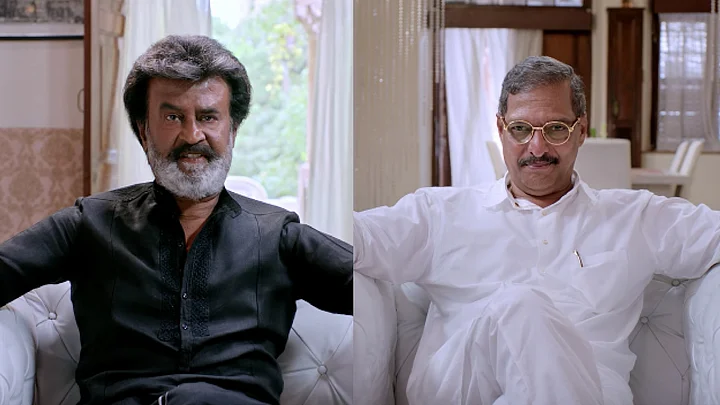Beemji (Pa Ranjith) is the most vocal political filmmaker we have in Tamil cinema right now. The likes of Mani Ratnam, Balaji Sakthivel, and Vetrimaaran that present their stories with political overtones make broad statements, but Ranjith takes a great step ahead of them sheerly with his belief systems. His penchant for telling stories like none other has given him a special place in the Tamil film industry, and there’s no doubt that he will continue to open his Ambedkar inspired bag of revolutionary ideas for his future films as well.
In his latest directorial project, Kaala, Ranjith has two terrific actors - Rajinikanth and Nana Patekar to work with. While Rajni has built his career on the foundation of a bunch of cool mannerisms, Patekar has time and again proved his talent via hard-hitting performances. When these two stars from different poles are put together, the dish ends up to be a potpourri of amazing scenes.
We’re introduced to Hari Dada (Nana Patekar) through the humungous posters – and the plastic grin he carries in them – that occupy the walls and posts of Dharavi, inKaala. He plays a larger-than-life politician who struts around in white-and-white. His shirts are always crisply-washed white, just like his pants.
These trite symbols of Indian politicians aren’t merely used to mimic the philosophies of the white versus black politics. It follows the narrative through every step of the curve, and comes in handy in the climactic portions where Hari Dada is drenched in the colours he hates the most.
The much-awaited face-to-face between the protagonist and the antagonist in Kaala happens almost an hour and twenty minutes into the film. When Hari Dada comes face-to-face with Kaala (Rajinikanth, who else?) finally, we learn that he considers the people of Dharavi (where the entire film is set in) to be below him. Until that point, we’re only told of Hari’s money-making schemes and evil intentions. As Selvi (Eswari Rao) points out that he’s refused to drink water – due to their caste / class status in the social hierarchy – at their place, the disgust for his ilk grows in the quietened movie hall.
Hari is the sort of person who’d probably support honour killings. The film doesn’t go that far since its political boundaries are limited to the premise of land-grabbing. But you can see a version of him in this year’s Rangasthalam. Dakshina Murthy (Prakash Raj), in the Telugu drama, passes an order to murder her daughter’s lover since the boy belongs to a lower caste. And, like Hari Dada, Murthy, also, is a soft-spoken politician. The similarities end there!
Hari’s demeanor is in contrast to Kaala’s outgoing nature. The former throws around words calculatingly and even smiles less. He preserves his energy for the big speeches he does during the election campaigns. Kaala, on the other extreme, is fond of making small talk with the people he encounters on a daily-basis. Interestingly, though, the order of stereotype is reversed in this film.
The good-natured hero is referred to as Yaman (the Lord of Death) and Raavanan (a nod to the King of Demons); whereas, the villain is named after the Saviour Lord.
And that’s why the line, “Otha Thala Raavana, Pathu Thala Aavuda (single-headed Raavana, become a ten-headed Raavana)” gains prominence in the Katravai Patravai... song.
For a hero to win in an Indian commercial film, the anti-hero has to be as strong as the hero either physically (Baahubali), or mentally (Thani Oruvan), Nana Patekar’s Hari Dada is a mix of both. He has the arrogance of a wealthy politician, and the cunningness of a foot-soldier.
Patekar is excellent as the Rama-named antagonist. With his Hari Dada, he joins the ranks of Tamil cinema’s most-remembered villains in a Rajni movie, along with Anthony (fromBaashha) and Neelambari (from Padayappa). Whenever he says, “I want to make this country clean and pure,” you can smell the irony clearly. Here’s a casteist politician who won’t take a sip of water from a lower-caste household, but wants to sweep away the dirt in the slums (actually, that’s a metaphor he applies to take a dig at the skin-colour of the Dharavi residents).
The only grouse against his performance would be the terrible lip-sync. Nana Patekar’s actions and words don’t match at all.
His lines in Hindi / English / Marathi work perfectly, and, somehow, when he opens his mouth to say the dialogues in Tamil, they sound utterly unbearable. And, that is, perhaps, the dirt I’d like to remove from his portrayal of Hari Dada.
Eight years after Rajni, the superstar, fought with himself in Endhiran (because he played both, the hero and the villain), he’s got a bombastic nemesis in Kaala.
